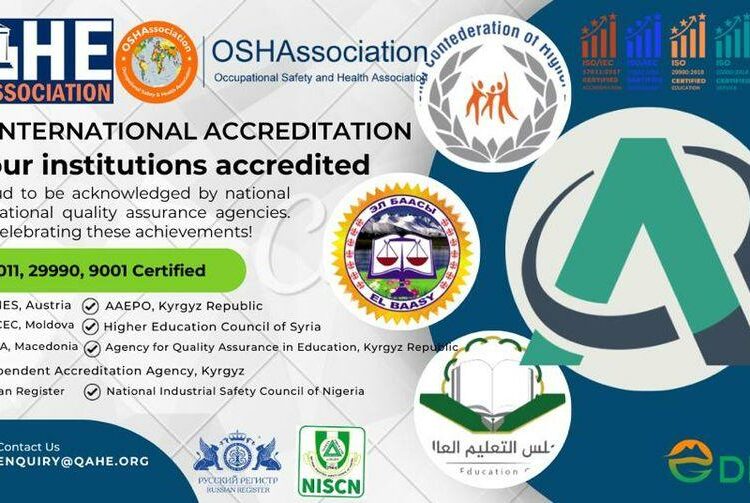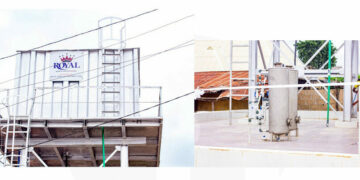In today’s rapidly evolving educational landscape, accreditation holds immense significance in establishing the quality and credibility of academic institutions. The International Association for Quality Assurance in Pre-Tertiary and Higher Education (QAHE), an esteemed accreditation agency, is a renowned independent and private organization committed to providing accreditation services to educational institutions (From pre-primary to tertiary institutions), certification bodies, e-learning management system providers, and training organizations. With its recognition from various worldwide organizations and compliance with international standards, QAHE accreditation signifies an institution’s dedication to delivering quality education. This comprehensive article explores the importance of accreditation in Nigeria, the accreditation process, and how QAHE can help educational institutions in Nigeria achieve international recognition.
With its comprehensive accreditation process, QAHE offers accreditation services to universities, educational institutions, training centers, language schools, preschools, and learning centers in the country. The accreditation process encompasses various aspects such as distance learning accreditation, course accreditation, school accreditation, and accreditation of training institutions. By obtaining accreditation from QAHE, educational institutions and training centers gain the advantage of international recognition, facilitating their growth and attracting students and stakeholders. Whether it’s starting a university or a school, QAHE provides guidance on how to get accredited, ensuring that the institutions meet the required quality standards. Private schools and universities can also seek accreditation from QAHE, which enhances their reputation and credibility. In addition, QAHE offers TESOL accreditation for language schools and accredits online colleges, providing them with the recognition they deserve. By obtaining accreditation from QAHE, institutions and training providers demonstrate their commitment to delivering quality education and training, thereby contributing to the overall improvement of the educational landscape in Nigeria.
Accreditation serves as a validation of the quality and effectiveness of educational programs offered by universities, colleges, and schools in Nigeria. It assures students, parents, and stakeholders that the institution meets rigorous educational standards and provides a conducive learning environment. In the Nigerian context, accreditation plays a crucial role in many aspects:
- Enhancing Educational Quality: Accreditation enhances the quality of education by ensuring that institutions adhere to established standards and benchmarks. It promotes excellence in teaching, research, and administrative practices, leading to improved student outcomes and overall educational experience.
- Attracting Students and Faculty: Accreditation from a reputable organization like QAHE enhances an institution’s reputation in Nigeria, attracting students and faculty seeking quality education and research opportunities. It establishes trust and credibility among stakeholders, contributing to increased enrollment and retention rates.
- International Recognition: QAHE accreditation in Nigeria enhances an institution’s international recognition and reputation. It positions Nigerian institutions as globally competitive and provides opportunities for collaborations, exchanges, and partnerships with international educational institutions. This recognition opens doors to global mobility for students and faculty, facilitating academic and cultural exchanges.
- Quality Assurance and Continuous Improvement: Accreditation ensures that institutions in Nigeria have robust quality assurance systems in place. It promotes continuous improvement, accountability, and transparency in educational practices, ultimately benefiting both students and institutions. By adhering to accreditation standards, institutions can identify areas for improvement and implement necessary changes to enhance the quality of education.
QAHE offers a range of accreditation services tailored to meet the unique needs of Nigerian vocational schools, universities, colleges, and training organizations. These services include:
- Comprehensive Evaluation: QAHE conducts a comprehensive evaluation of key aspects, including research performance, technology used, student services, teaching quality, and adherence to international standards.
- Affordable Accreditation: QAHE believes in making quality accreditation accessible to all deserving institutions in Nigeria. With over 150 institutions already accredited, QAHE offers affordable accreditation services, ensuring that institutions of all sizes can demonstrate their commitment to providing quality education. The organization understands the financial constraints faced by many educational institutions and aims to support their accreditation journey.
- International Recognition and Collaborations: QAHE’s accreditation is recognized by prestigious organizations and national bodies worldwide, including the National Agency for Quality Assurance in Education and Research (ANACEC) in the Republic of Moldova, the Directorate for Research, Planning, and Funding Accreditation in North Macedonia, and the Accreditation Council for Education “LAMDIK” in Indonesia (ACE), Technology and Human Association (TEKINDER) in Turkey, Directorate for Research, Planning, and Funding Accreditation, North Macedonia,, Council on International Higher Education Supervision (CONIES) in Austria, Public Foundation Independent Accreditation Agency “BILIM-STANDARD,” AAEPO, Independent Accreditation Agency “Elbaasy”, EdNet of Kyrgyz Republic, Higher Education Council of Syria, Information Systems Security Association, Egypt Chapter (ISSA Egypt), International Association for Biblical Education, OSHAssociation, National Industrial Safety Council of Nigeria, Independent Perception and Research Hub (IPRH) and many others. The recognition enables Nigerian institutions to attract international students and faculty, contributing to the overall growth and development of the Nigerian education sector.
- Compliance with International Standards: QAHE has undergone rigorous assessments and adheres to international standards, including ISO 9001:2015 (Quality Management System), ISO 20000:2018 (Service Management System), ISO 17011:2017 (requirements for the competence and impartiality of accreditation bodies), ISO/IEC 17040:2005 (requirements for peer assessment processes), and ISO 27001:2013 (Information Security Management System). Compliance with these standards ensures that QAHE follows best practices and maintains the highest level of quality and integrity in its accreditation processes.
QAHE has a strong and established presence in Nigeria, working closely with various educational institutions and organizations to promote quality education and accreditation. Dr. Festus C. Daniel, the National President of the National Industrial Safety Council of Nigeria, holds the prestigious position of Honorary Fellow at QAHE, showcasing the organization’s collaboration with prominent figures in the Nigerian educational landscape.
QAHE goes beyond traditional accreditation services and collaborates with its partner, AQS UK, to assist accredited institutions in obtaining ISO certifications. ISO certifications provide further recognition and validation of an institution’s commitment to quality and excellence in education and learning services. One such certification is ISO 29995:2021, which acknowledges an institution’s dedication to delivering exceptional education and learning experiences. This certification highlights the institution’s adherence to rigorous standards in curriculum development, instructional delivery, and student support services. Another important certification is ISO 29990:2010, which demonstrates an institution’s proficiency in providing non-formal education and training programs. ISO 29993:2017 recognizes an institution’s excellence in delivering learning services outside the formal education system. For effective management systems, ISO 21001:2018 is a valuable certification that emphasizes a student-centered approach to education. ISO 9001:2015 is another significant certification that demonstrates an institution’s commitment to quality across all aspects of its operations. In the realm of technology-enabled learning, ISO/IEC JTC 1/SC 36 Information technology for learning, education, and training certification ensures compliance with international standards for online learning solutions. ISO/IEC 40180:2017 focuses on quality assurance, management, and improvement in IT-enhanced learning, education, and training (commonly known as E-Learning). Lastly, ISO 29994:2021 sets specific requirements for distance education, promoting transparency and instilling confidence in learners.
Through its tailored accreditation process, affordable services, international recognition, and adherence to international standards, QAHE provides Nigerian institutions with a competitive edge and the opportunity to showcase their dedication to excellence. By obtaining QAHE accreditation, institutions in Nigeria can attract a diverse student body, foster international collaborations, and contribute to the global advancement of quality education.





